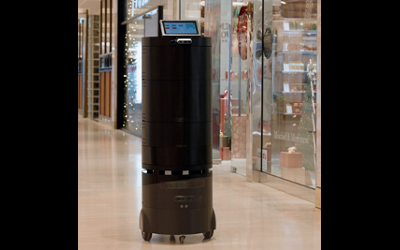UK robotics project receives major funding to enhance hospital efficiency and safety

A groundbreaking robotics project, which is led by Prof Enrico Motta’s team at the Knowledge Media Institute (KMi) of The Open University (OU), has secured funding from Innovate UK to enhance hospital efficiency and safety using AI-driven robots. The project aims to deploy smart robots capable of performing routine tasks, such as medicine delivery, while also identifying potential health and safety hazards in hospital settings to free-up staff time and resource.
Building on success: from PhD research to hospital robots
The project’s roots can be traced back to a highly successful PhD research effort at the OU by Agnese Chiatti. Whilst studying for her PhD, Chiatti developed a robot capable of navigating its environment and recognizing potential hazards, such as fire risks from improperly placed materials in laboratories. This achievement earned her a prestigious L’Oréal-UNESCO award for women in science, setting the stage for further exploration into how robotics can transform real-world environments.
Enhancing hospital safety and efficiency
Prof Motta’s team will collaborate with Swift Robotics, an exciting local startup that is pioneering the deployment of robots in hospitals and shopping centres. Their robots, which are designed to handle delivery tasks, such as transporting medications and food, will be upgraded in the course of the project to take on more complex responsibilities. In particular, these robots will be equipped with the capability to detect unusual events, like intruders or wandering patients, open doors that should be closed, hazards left on the floor and other anomalies.
Hospitals can struggle with limited staffing, particularly during night shifts, when fewer people are on duty to monitor patients and hospital safety. This is where the enhanced robots come in. As they carry out routine deliveries, they will simultaneously scan the hospital for potential risks. The ability to identify and report these issues in real time could improve hospital safety, free up staff for more critical tasks, and potentially save lives.
The project aims to demonstrate that robots can perform beyond routine delivery tasks, adding significant value by augmenting the safety and operational capabilities of hospitals. This will be trialled in MK University Hospital as part of the OU’s relationship with Milton Keynes council, under the umbrella of the MK:Smart initiative, a research and development programme that began back in 2014 and continues to foster innovation and growth in Milton Keynes. Wider success after the project would mean not only a demonstration of the technology in controlled settings but also potential widespread adoption in healthcare facilities across the UK and beyond.
An international collaboration
The project is part of the Eureka framework, a European initiative that supports collaborative innovation. It involves partners from Finland, Switzerland, South Korea, and the UK, all working under the banner of "Resilient Enterprise." While each country’s research team focuses on different aspects of this broad theme, the OU’s work centres on healthcare and robotics.
Longstanding partnerships and new opportunities
Prof Motta’s team has a long-standing relationship with the Finnish VTT Technical Research Centre, which coordinates the project. This collaboration began in 2008, and the mutual trust and strong reputation of both institutions helped secure their place in this new venture. "We were approached by VTT to be part of this exciting project," Prof Motta explained, "and we were keen to get involved, especially with the opportunity to bring our expertise in robotics and AI to the healthcare field."
Prof Motta highlighted that the OU and its Knowledge Media Institute have built a strong international reputation for high-quality research, which was a key factor in securing the project. “People know that we are reliable and that we deliver,” he said, underscoring the importance of reputation and trust in these kinds of international collaborations.
Real-world impact and societal benefits
One of the most exciting aspects of the project is its potential societal impact. As healthcare systems worldwide face increasing strain, particularly in countries like the UK, the project offers a potential solution to some of the operational challenges faced by hospitals. While the robots won’t solve systemic issues like staff shortages, they can free up valuable time for hospital staff, allowing them to focus on more critical, hands-on patient care.
In addition to increasing efficiency, the robots also offer a potential cost-saving benefit. By automating routine tasks such as delivering medicines or monitoring safety hazards, hospitals could reduce reliance on human resources for these jobs, reallocating funds and personnel to areas of higher need.
Contact our news team
For all out of hours enquiries, please telephone +44 (0)7901 515891
Contact detailsNews & articles

OU researchers lead international advances in planetary protection
Open University researchers are leading international advances in planetary protection, helping ensure that space exploration is safe, sustainable, and scientifically rigorous.